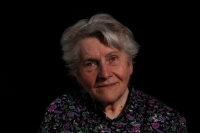Church work is not only performing religious acts, but also friendship

Download image
Anna Dusová was born as Anna Říčanová on 4 September 1935 in Bohuslavice nad Metují in the family of an evangelical pastor Rudolf Říčan and his wife Libuše, née Vorlová. She grew up with her four siblings in a rural Evangelical parish. Her extended family was affected by the Nazi occupation. In May 1935, she witnessed the arrival of the Red Army and the atrocities against German prisoners by Soviet soldiers and local people, against whom her father actively opposed. In 1946 the family moved to Prague, where Rudolf Říčan took up a position as head of the Department of the History of Christianity at the Comenius Evangelical Divinity School. She began studying at a grammar school, but after the communist coup in 1948, when multi-year grammar schools were abolished, she had to return to primary school. Between 1950 and 1953 she studied pediatric nursing at the secondary medical school, working among other things at the pediatric surgery at Charles Square. In 1953, at the Komenský summer camp in Běleč nad Orlicí, she met her future husband Jan Dus, also the son of an evangelical pastoral family. Because of his father’s public appearances, he was called up for military service in the Auxiliary Technical Batalions and was able to finish his studies in theology only afterwards - he graduated in 1957. In the same year Anna married him and together they moved to Litoměřice, where Jan became a vicar and later a pastor at the Evangelical parish in Chotiněves. Most of the parishioners were Volhynian Czechs from Boratín. In the early 1960s, Jan Dus was involved in protests against the introduction of an amendment to the Family Law that would have outlawed Christian education in families. His initiative was successful, but in 1964 he lost his state approval to exercise his priestly vocation and worked for two years as a gas station attendant. Four children were born to Mr. and Mrs. Dus, Monika (1958), Anna (1960), Michal (1962) and Jan Ámos (1966).

